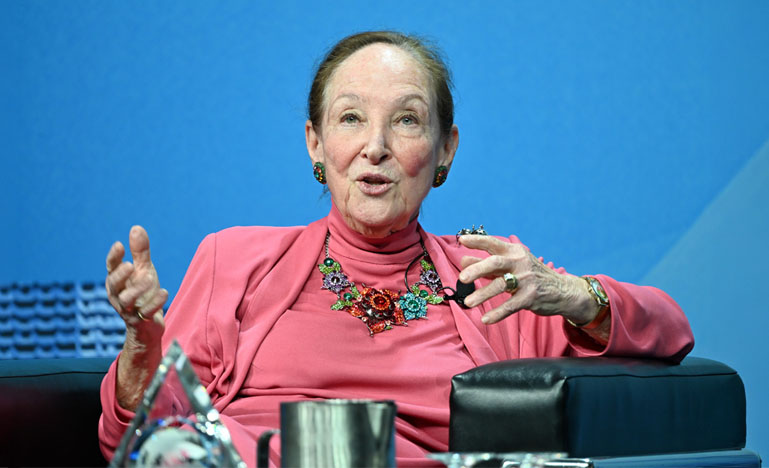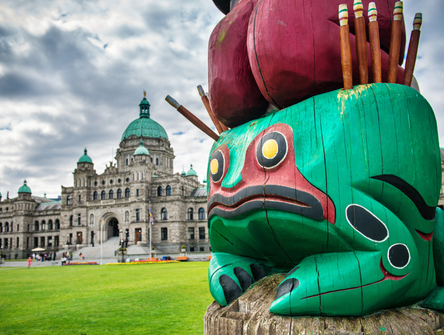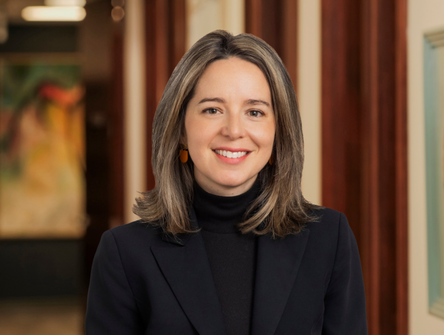Abella issues rule of law rallying cry
'If we judges and lawyers don't protect justice, then democracy doesn't have a chance'

Former Supreme Court Justice Rosalie Silberman Abella’s life began in a country where there was no democracy, no rights, and no justice.
It created an unquenchable thirst in her for all three.
She was born in Stuttgart, Germany, in 1946, after the Second World War, during which her parents spent more than three years in concentration camps. Her brother, just two, and her father's parents and three younger brothers were all killed at Treblinka. Her father was the only person in his family to survive the war.
No one with this history does not feel lucky to be alive and free, nor do they take anything for granted.
“You cannot be born in the shadow of the Holocaust, to two Jews who survived it, without an exaggerated commitment to the pursuit of justice. You cannot grow up indifferent to a just rule of law when every adult you love experienced a horror of its subversion,” Abella said.
"And no one with this history does not feel that lawyers have a particular duty to promise our children that we will do everything humanly possible to keep the world fairer for them than it was for their grandparents — a world where all children, regardless of race, colour, religion or gender, can wear their identities with dignity, in pride and in peace.”
As she accepted the Benjamin B. Ferencz Rule of Law Lifetime Achievement Award at the International Bar Association conference in Toronto this week, Abella told those gathered that while she is very proud to be a member of the legal profession, she’s never forgotten why she joined it.
The award is named after the chief prosecutor at the Einsatzgruppen trial at Nuremberg, who was just 27 at the time, and who championed replacing the "rule of force with the rule of law.” He went on to become a scholar and architect of the International Criminal Court. Abella said he not only believed in world peace, he spent his life trying to figure out how to make it happen because of what he had witnessed at the German concentration camps he helped liberate.
“Having my name linked with Ben Ferencz, with the rule of law and with the International Bar Association, not only brings all of the pieces of my life together, it explains it because it links me with the aspirational international collaboration of law, lawyers and judges at Nuremberg,” she said.
“Who I am, what I am, what I believe in, what I hope for all start there.”
‘At a crossroads’
To honour Ferencz’s legacy, her speech was a tribute “to the role of law, the rule of law and the inspirational lawyers and judges who promoted and protected it at Nuremberg.”
At times emotional, it also served as a rallying cry to stand up and protect the rule of law, given the threat it faces in many parts of the world today.
“We are at a crossroads in so many ways, and the choices we will make as lawyers, as a profession, will determine not only how history will judge us,but what kind of world we will have,” she said.
“To me, lawyers are democracy's warriors because lawyers represent the best hope that justice will be protected.”
This month marks the 80th anniversary of the beginning of the Nuremberg trials held by Allied forces to prosecute prominent leaders in Nazi Germany. Abella said along with the Universal Declaration of Human Rights, the trials were “the phoenixes that rose from the ashes of Auschwitz.” They represented the global consensus that there were to be no more human rights abuses — that what happened to Jews would never happen again to anyone.
“Nuremberg was the legal engine that exposed, held accountable and defined the bedrock principles for a future in which justice would be protected and directed by a new global legal regime,” she said.
“We made a commitment then to humanity that we would protect the world from inhumanity, and that the protection of rights, which is at the heart of democracy, is a sacred trust.”
Millions of people died in the Second World War because they didn't have rights, while millions of others died fighting to make sure the rest of the world got them.
Lessons the world hasn’t learned
Abella said the world was supposed to learn three lessons from Nuremberg. First, that indifference is the incubator of injustice. Second, that it's not just what you stand for, it's what you stand up for. And finally, that we must never forget how the world looks to those who are vulnerable.
However, we still haven’t learned the most important lesson, which is to try to prevent rights abuses in the first place.
While lawyers tend to take some comfort in the possibility of a subsequent judicial reckoning, such as what occurred at Nuremberg, Abella asked whether subsequent justice is an adequate substitute for justice.
As she sees it, the current gap between the values the international community articulates and the values it enforces is so wide that almost any country that wants to can push its abuses through it.
No national abuser seems to worry whether there will be a Nuremberg trial later, because usually there isn’t. And by the time there is, all the damage that was sought to be done has already been done. In too many parts of the world, Abella said, there are no regrets, no tolerance, no justice and no hope.
“They’re putting the rest of the world in danger because intolerance, the world's fastest growth industry, seeks, in its hegemonic insularity, to impose its intolerant truth on others.”
And yet all too often, we’re reluctant to call intolerant countries that abuse their citizens to account, and hide behind silencing concepts like cultural relativism, domestic sovereignty or root causes.
“These are concepts that excuse injustice," she said.
“Silence in the face of injustice means injustice wins.”
We’re trapped in a frenetically fluid, rhetorically tempestuous, ideologically polarized and economically myopic discourse that is clamouring for our attention. She worries the ideals of fairness and justice that have guided her all her life are under siege, and about the lack of consensus about what justice, truth, or democracy mean, or what law is for.
“Too often, law and justice are in a dysfunctional relationship. We're in a mean-spirited, moral, free-for-all that puts us at the edge of a future unlike any I've seen in my lifetime,” Abella said.
A disregard for democratic norms
Instead of learning the horrendous cost of discrimination from the Second World War, “we're forgetting our compassion and penalizing the vulnerable in the world.”
“The lawyer in me is watching, in heartbreak, the Cavalier disregard in so many parts of the world for rudimentary democratic norms, for settled expectations of decency and for human and civil rights.”
Knowing that the world did nothing to speak out about the insidious and ultimately genocidal rise in anti-semitism, revelling in the Allies' triumph over it and the chance to grow up in a world whose moral guardrails were found in the Universal Declaration of Human Rights, and understanding that experiencing the helpless vulnerability of being different, obliged us to protect others who were different, Abella says has driven everything she’s done in her life.
“It's the way I pay tribute to the resilience of my parents and the other survivors.”
As she sees it, collectively, we need to stop yelling at each other and start listening to reclaim ownership of our civility, humility, dignity, and the liberal democratic values the Allies fought for and won the war to protect, as well as ownership of our right to be different.
“Above all, we need to replace global hate with global hope.”
The noblest profession
Abella grew emotional as she spoke of her father, a lawyer who was denied the ability to practice in Canada when the family arrived here in May 1950 because he wasn’t a citizen.
“My father died in March of 1970, a month before I finished law school. He didn’t live to see his inspiration take flight in his daughter, or in her two sons who followed in his footsteps,” she said.
“But not before he taught me that being a lawyer was the noblest thing you could be, and that democracies and their laws represent the best possibility of justice.”
Abella said justice is the gift that keeps right on giving, propelling her from a displaced persons camp in Germany to become the first Jewish woman of the Supreme Court of Canada.
“Democracy does not just depend on the will of the people, but on their humanity. If we judges and lawyers don't protect justice, then democracy doesn't have a chance.”


